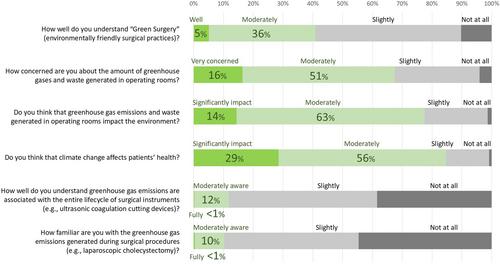Green Surgery Awareness and Challenges: A Survey Among Members of the Japan Society for Endoscopic Surgery
Abstract
Introduction
Global warming poses an urgent challenge, with the healthcare sector being a significant contributor to greenhouse gas (GHG) emissions. The rise in minimally invasive surgery, which often depends on energy-intensive technologies and single-use devices, further exacerbates this environmental burden. The concept of “Green Surgery” aims to reduce the environmental footprint while maintaining patient care standards. Yet awareness and attitudes of surgeons in Japan regarding these practices are largely unknown.
Methods
The Japanese Society for Endoscopic Surgery (JSES)'s Working Group on Environmental Issues conducted an online survey with 21 questions exploring knowledge of Green Surgery and perspectives on sustainable practices. The survey was distributed to all JSES members, with anonymous responses collected between October 18 and November 12, 2024.
Results
A total of 1601 participants (10.1%) responded. Awareness of Green Surgery was limited, with only 5% demonstrating a well-developed understanding, though 67% expressed concerns about GHG emissions and operating room waste. Environmentally friendly practices were reported by only 14% of respondents' facilities, with perceived cost increases (55%) and workflow changes (39%) as key barriers. Nonetheless, 82% were willing to adopt sustainable practices, preferring reusable instruments (74%) and remanufactured single-use devices (66%).
Conclusion
This survey highlights the challenges and opportunities in promoting Green Surgery in Japan. Despite limited awareness, there is considerable interest in adopting sustainable practices. These findings support the JSES in spearheading initiatives to integrate sustainability into surgical practices, thereby aiding in achieving global climate goals.


 求助内容:
求助内容: 应助结果提醒方式:
应助结果提醒方式:


